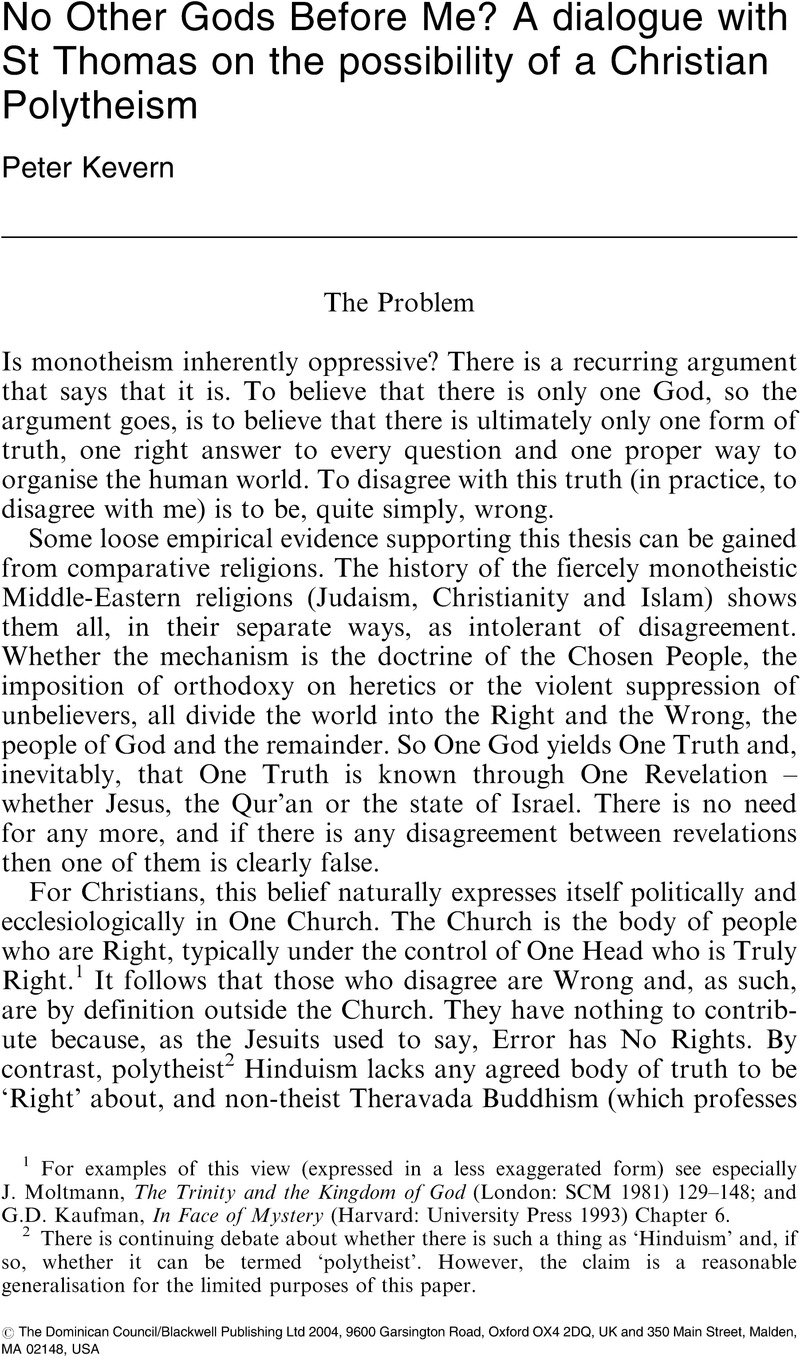No CrossRef data available.
Article contents
No Other Gods Before Me? A dialogue with St Thomas on the possibility of a Christian Polytheism
Published online by Cambridge University Press: 01 January 2024
Abstract

- Type
- Original Articles
- Information
- Copyright
- Copyright © The Dominican Council/Blackwell Publishing Ltd 2004
References
1 For examples of this view (expressed in a less exaggerated form) see especially Moltmann, J., The Trinity and the Kingdom of God(London: SCM 1981) 129–148Google Scholar; and Kaufman, G.D., In Face of Mystery(Harvard: University Press 1993)Google Scholar Chapter 6.
2 There is continuing debate about whether there is such a thing as ‘Hinduism’ and, if so, whether it can be termed ‘polytheist’. However, the claim is a reasonable generalisation for the limited purposes of this paper.
3 So e.g. D’Costa, G., The Meeting of Religions and the Trinity(Edinburgh, T&T Clark 2000)Google Scholar.
4 So, most clearly, Colin Gunton's lectures on The One, the Three and the Many(Cambridge: University Press 1993)Google Scholar; Boff, L., Trinity and Society(Tunbridge Wells: Burns and Oates 1988)Google Scholar.
5 It may be asserted a) that the current view of Trinity is a distortion and fiction in that it treats the hypostases as self-conscious subjects, and b) that the argument for a ‘Social Trinity’ is circular, constructing the Trinity on analogy with human society and then back again For a succinct critique, see Kilby, K., ‘Perichoresis and Projection: Problems with the Social Doctrines of the Trinity’, New Blackfriars 81:596 (2000) 432–445CrossRefGoogle Scholar.
6 See e.g. Hick, J., God Has Many Names(London: Macmillan 1980)CrossRefGoogle Scholar. Criticism centres on the way this theory leaves the definition of Divine Truth in the hands of academics, unless it is made subject of a sort of transcendental deduction which empties it of all particularity. So e.g. D’Costa, G., John Hick's Theology of Religions(London: University Press of America, 1987)Google Scholar.
7 See Heim, S.M., Salvations: Truth and Difference in Religion(Maryknoll: Orbis 1995)Google Scholar.
8 Even this may be too ‘Christian’ an answer, since salvation is a distinctively Christian concern (see DiNoia, J., The Diversity of Religions(Washington: Catholic University of America Press, 1992)CrossRefGoogle Scholar, but it is sufficient for the present purposes.
9 See Kaufman, Gordon D.. ‘Religious Diversity and Religious Truth’ in God, Mystery, Diversity(Minneapolis: Fortress 1996) 187–203Google Scholar: ‘…there is little agreement on questions of religious truth, or on how disagreements in this field should be adjudicated among Buddhists and Moslems, Hindus and Christians. Each tradition seems to have worked out what it will regard as “true”, and by what criteria these “truths” can be validated.’(187)
10 The reader may note that this construction of the relation between confessional and general truth about God has affinities with some elements of Old Testament belief, in which YHWH was seen as the ‘One God’ in the sense of the one patron of the Israelites, rather than the only form of the Divine.
11 The English version I am using here is the Blackfriars edition begun in 1963. Quotations from Volume 6 (1a. 27–32), trans. Ceslaus Velecky O.P. (London, Eyre & Spottiswoode, n.d.).
12 ‘There are two kinds of number, namely pure or abstract (for instance two, three, four) and applied number in things numbered (for instance, two men, two horses). If abstract or absolute number be used of God then there is no reason why there should not be whole and part in him, for this is only in our minds’ representation; for number apart from things numbered exists only in the mind.’Summa 1a. 30. 1 ad 4.
13 See also the Reply to 30.3.
14 The gist of the argument is that there are three distinct relations in the Godhead – Fatherhood, Sonship and Procession – and a person is defined by their relations within the Godhead rather than by possession of an independent substance. Two Persons with the same relations (for example, two ‘sons’) would be the same Person.
15 ‘The more perfect a creature the more interior activities it has…Now God infinitely surpasses all creatures…Hence the divine persons are infinite.’
16 ‘From the infinite goodness the Father gives himself infinitely in producing a divine person. But there is infinite goodness also in the Holy Ghost. Therefore the Holy Ghost produces a divine person, who produces another, and so to infinity.’
17 ‘Everything that can be limited to a definite number can be measured, for number is a kind of measure. Yet divine persons are immeasurable…Therefore they are not restricted to the number of three.’




